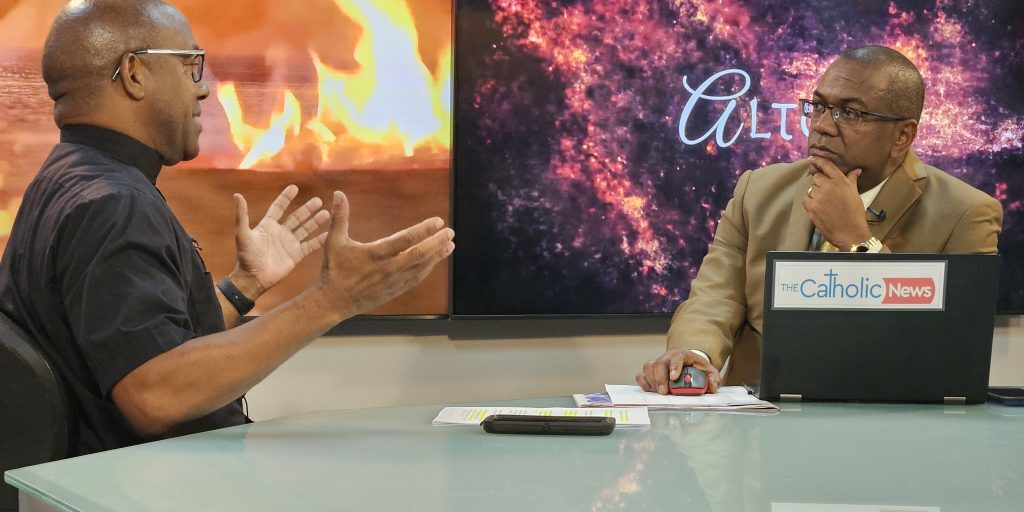In the first Altos interview for 2024, Fr Donald Chambers, the General Secretary of the Antilles Episcopal Conference, provided a comprehensive discussion on the contentious document Fiducia Supplicans.
This magisterium, published December 18, 2023, has ignited global controversy, particularly in its implications for traditional Church teachings, especially those pertaining to the LGBTQI community.
Response of African bishops
Many headlines purported the African bishops’ outright rejection of the document due to cultural and legislative practices in many of the African countries. This however is not accurate.
Fr Chambers clarified the African bishops’ response, stating, “The African bishops have not rejected the declaration of the Holy Father….What they have done is that they have said that they will need time for further reflection and pastoral application because of the unique context of Africa.”
By calling for more time and consultation, the African bishops chose a wise middle road of neither outright rejection nor blind embrace. As Fr Chambers noted, they acted precisely as Pope Francis would want in incarnating responses within lived cultural realities.
Fiducia Supplicans, translating to “asking for trust,” was elucidated by Fr Chambers during the interview. He explained the document’s nuanced approach, distinguishing between ritual blessings that require conformity and non-ritual or spontaneous blessings, described as gestures fostering increased trust in God.
Fr Chambers emphasised the significance of this distinction, stating, “The spontaneous blessings are simply gestures that provide an effective means of increasing trust in God on the part of the person who asks. Hence the title, Fiducia Supplicans literally means asking for trust.”
The theological foundation and purpose of Fiducia Supplicans were explored during the interview.
Fr Chambers highlighted that “The document is based on a theological understanding that blessings are grounded in the incarnation. By virtue of God becoming human, God has blessed us. He has blessed humanity.”
The document introduces the concepts of descending and ascending blessings.
‘Descending blessings’ refer to blessings that come directly from God to humanity. By taking on human form through Jesus Christ, God has bestowed divine blessing upon all human beings. This would be an example of descending spiritual gifts – flowing down from the divine to the human realm.
In contrast, ‘ascending blessings’ describe the blessings communicated from humans on Earth up toward Heaven. Now that the Church has the power to confer blessings as Christ’s instrument on Earth, the clergy and lay faithful can offer blessings that ascend to God.
An example would be a priest blessing a married couple by invoking God to sanctify their union. Or a lay person saying grace before a meal, asking God’s blessing upon the food. These prayerful petitions and intercessions start from humanity and “ascend” as supplications to Heaven.
No change to Church’s teaching on marriage
Throughout the interview, Fr Chambers underscored Pope Francis’ consistent pastoral approach. “Pope Francis since the start of his papacy, has not, has never challenged or attempted to change the teachings of the Church on marriage.” This clarification aims to dispel concerns about a perceived deviation from traditional Church teachings.
Instead, Pope Francis advocates for a pastoral approach that applies these teachings with mercy and understanding to real-life situations.
Regarding the Church’s teachings on marriage, Fr Chambers clarified, “It does not change it. In the document, it makes very clear the Church’s position on marriage between a man and a woman for the purpose of procreation. It is very, very clear.”
While reaffirming the Church’s stance against liturgical blessings for same-sex unions, the document encourages non-ritual spontaneous blessings. Fr Chambers stressed, “If someone comes to you spontaneously after Mass or after a service and says, ‘you know, Father, can you bless me?’, we should not refuse that. That is a non-ritual spontaneous blessing.”
This distinction reflects the pastoral flexibility advocated by Pope Francis, allowing for gestures of blessing outside the formal liturgical context.
Fr Chambers connected the document to the concept of synodality, emphasising walking together as a diverse community. He stated, “Synodality is about walking together. And the people of God are made up of bishops and priests and laypersons, everyone walking together, excluding none.”







